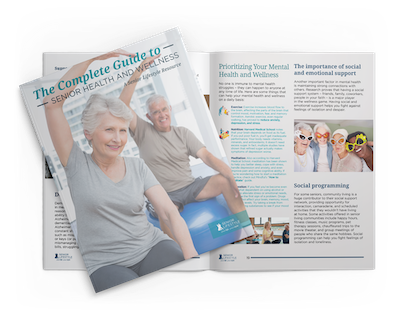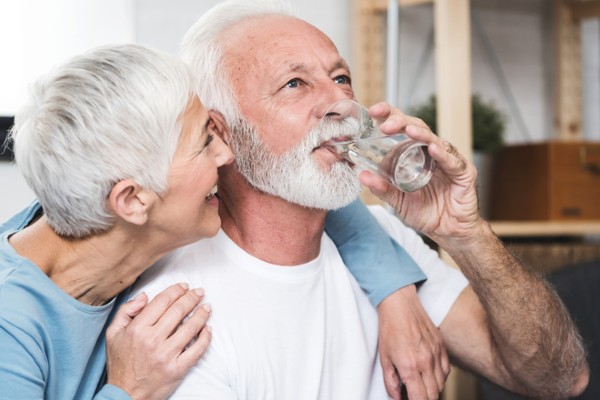Dehydration runs rampant among Americans. The National Institutes of Health cites reports that 75% of Americans are chronically dehydrated. It’s also reported that 17% to 28% of older adults are dehydrated.
Lack of hydration, though sometimes difficult to detect, can affect your health. This is why it’s so important to take in enough water as you age.
There has been confusion about how much water adults need each day. Although you may hear that you should drink eight glasses of water a day, the National Academies of Science, Engineering and Medicine say the standard should be around eight to 10 glasses per day.
Find out more about dehydration, how to recognize dehydration in seniors, and how to prevent dehydration in older adults.
Why Older Adults Are More Prone to Dehydration
Our bodies are always losing water, through the lungs, skin, kidneys and gastrointestinal tract. Dehydration occurs when water loss exceeds water replacement.
As you age, four factors may lead to dehydration.
1. Less Water Reserves
Your body’s fluid reserves shrink as you get older. This means you don’t carry as much water in your body, according to the Cleveland Clinic. Without constant replenishment, this means you can easily become dehydrated.

Download The Complete Guide to Health & Wellness for Seniors
As people grow older, their health and wellness needs change. Read our eBook, “The Complete Guide to Health & Wellness for Seniors” for everything you need to know about staying healthy and happy as we age.
Download the Guide2. Decreased Kidney Function
Kidney function can decline with age, according to Healthline. This means that more water may be lost through urination. This condition can also lead to kidney stones, urinary tract infections and other illnesses.
3. Diminished Sense of Thirst
When you start to get dehydrated, you start to get thirsty. But, as you age, that sense diminishes, Cleveland Clinic says. Because of that, many seniors don’t drink enough liquids to stave off dehydration. In fact, it’s a common cause of hospitalization among seniors.
4. Illnesses and Use of Medications
Many seniors may have conditions or take medications that increase the risk of dehydration, according to the Mayo Clinic. This means chronic illnesses like untreated diabetes or kidney diseases can increase dehydration. Even minor illnesses like a cold or a sore throat can drain your water. Also, taking medications such as diuretics will cause dehydration.
How to Recognize Dehydration Symptoms in Seniors
Severe dehydration in seniors may cause shriveled skin, a sunken look in the eyes, low blood pressure, and delirium.
There is a quick, simple test to check for dehydration, according to Dispatch Health. Pinch the skin on the back of your hand and watch how quickly it returns to normal. If it snaps back immediately, you’re likely safe. If it remains in a tented shape for a second or two, that’s a sign that you may be dehydrated.
Here are other symptoms that you experience if you’re dehydrated:
- Confusion
- Dark-colored urine
- Dizziness
- Dry, sticky mouth
- Extreme thirst
- Fatigue
- Feeling dizzy or lightheaded
- Few or no tears
- Less frequent urination
- Muscle cramping
Preventing Dehydration in Seniors
There are a few things you can do to stave off dehydration, either for you or, if you’re a caregiver, for the person you take care of. Here are some tips from Healthline.
Hydration Tips for Seniors
Account for medical conditions. If you have an underlying health condition, such as diabetes or kidney disease, check with your doctor for your specific hydration needs.
Drink water throughout the day. If you don’t like plain water, try adding a squeeze of lemon or lime to add flavor.
Eat foods with high water content. Examples include celery, cucumbers, fruits, melons and low-sodium broths or soups.
Increase intake as needed. If you’re going to be outdoors or in humid conditions, or are exercising, drink more water.
Respond to any illnesses. Take more fluids if you’re ill with diarrhea, fever or vomiting. You can be losing more fluid that you’re taking in.
Take small sips. Some seniors may have trouble with swallowing, so sipping is helpful.
Try other liquids. You can try milk, sparkling water and low-sugar fruit juices. Coffee and tea contain caffeine, which can have diuretic effects.
Hydration Tips for Caregivers
Discourage diuretic beverages. Alcohol, coffee and some protein drinks can increase urination, which can aggravate dehydration.
Make water accessible. Make sure it’s easy to reach at all times.
Provide foods high in water content. Seniors may be more likely to stay hydrated if they have easy access to fruits, veggies and other high-water foods if they’re easy to obtain.
Remind seniors to hydrate. Make sure they’re taking in fluids throughout the day, especially during mealtimes and after exercise or exertion.
Simplify bathroom access. Some seniors may be concerned about making it to the toilet after drinking fluids, so make sure they can get there.
Try alternative drinks. Seniors may be more open to beverages that contain electrolytes, such as sports drinks and Pedialyte.
Stay Hydrated and Healthy at a Senior Community
Senior Lifestyle communities take the health of their residents seriously. At these communities, you’ll find on-site nursing help, healthful activities, exercise programs and more. Contact us today to find out more about Senior Lifestyle communities.

